IJCRR - 2nd Wave of COVID-19: Role of Social Awareness, Health and Technology Sector, June, 2021
Pages: 93-97
Date of Publication: 11-Jun-2021
Print Article
Download XML Download PDF
Stress in Nursing Professionals Who Work in Three Hospital Institutions That Care for Patients with COVID-19 In Lima, Peru
Author: Rosa PS, Hernan MS, Eduardo MS, Anika RA
Category: Healthcare
Abstract:Background: Stress in nursing professionals is one of the predictors generated by the care patients with COVID-19 and their ability to cope is important to provide good care. Objective: To determine stress nursing professionals who work in three Hospital Institutions that care for patients with COVID - 19 in Lima. Methods: It is a quantitative, non-experimental, descriptive, cross-sectional study with a total population of 329 nursing professionals, who answered a survey with sociodemographic data and the Nursing Stress Scale. Results: We observe that 97 (29.5%) of nursing professionals present low stress, 173 (52.6%) medium stress and 59 (17.9%) high stress. Conclusion: It is concluded, the detection of mental and emotional problems will allow the development of prevention strategies to protect the psychological well-being of nursing professionals.
Keywords: Stress, Nursing professional, Pandemic, Coronavirus, Work stress
Full Text:
Introduction
The new coronavirus disease (COVID - 19) that has affected the entire world has become one of the large-scale health challenges during these times for health professionals who are in the first line of care for patients with COVID–19,1 and as a result, many of the health professionals, due to the high demand for patients, the excessive hours of work and the environment in which they are found, have affected their mental health.2,3
Because of the high transmissibility and expansion of COVID – 19, it is considered one of the high occupational risks in health professionals, especially in nursing professionals,4,5 since they are professionals vulnerable to experiencing acute stress disorder because they are in the first line of care for COVID-19,6 where they are in direct contact 24 hours a day for their care, and therefore stress, exhaustion and overload work negatively influence their care.7,8 For this reason, the mental health of nursing professionals is becoming more vulnerable,9 since the cases of COVID - 19 today continue increasing, where the supply found in hospitals is no longer sufficient,10 where the high demand for care causes nursing professionals to increase their stress levels, bringing consequences that affect both personal and occupational levels.11
Therefore, to counteract stress in nursing professionals in the first line of care of patients with COVID-19, it is important to seek support strategies so that they can cope with it and be able to reduce the stress and work exhaustion that occurs in them,10 not only to improve on a personal level but also to improve their care and in their work environment.12 In a study carried out in Egypt,13 it was observed in 374 nursing professionals, in their results of stress due to COVID - 19, 13.4% presented mild stress, 26.2% severe stress and 52.1% moderate stress, interpreting that factors such as fear of infection, the work environment, fear of infecting the family, are predictors of increased stress in nursing professionals. In a study carried out in Spain,14 with 605 professional nursing participants, they stated about stress, that exhaustion and emotional overload in younger and less experienced professionals were witnessed higher levels of stress compared to professionals who already had more than 5 years of experience. In a study carried out in Jordan,15 with 448 professional nursing participants, in its results it was observed that 64% presented an acute stress disorder (ASD) and 41% presented psychological suffering, where the younger nurses were more vulnerable to perceive psychological anguish and due to this, while the perception of psychological anguish increases, the levels of ASD becomes higher.
Therefore, the objective of the study is to determine stress in nursing professionals who work in three Hospital Institutions that care for patients with COVID - 19 in Lima. Research hypothesis is that stress compromises the mental health of the nursing profession, making them more susceptible to being infected by COVID - 19.
MATERIALS AND METHODS
Type of Research
The research for its properties is quantitative, its methodology is descriptive, not experimental, cross-sectional. 16
Population
The population is made up of a total of 329 nursing professionals.
Inclusion criteria
-
Nursing professionals who have been working for 1 to more years
-
Nursing professionals who work only in hospital centres
-
Nursing professionals who have voluntarily agreed to be present in the study and who signed the consent informed ACTA N°048-2020-CE/UMA UNIVERSIDAD MARIA AUXILIADORA.
Technique and Instrument
A questionnaire was carried out, in which the data instrument The Nursing Stress Scale (NSS) is written. It has been structured as follows:
In the first block are the sociodemographic data such as age, sex, marital status, type of family and years working and in the second block is the NSS instrument that comprises 34 items divided into 3 dimensions, in the Physical Environment dimension it consists of 6 items, Psychological Environment with 18 items and Social Environment with 10 items, which is assessed with a Likert-type scale with 4 response options: “0 = Never”, “1 = Sometimes”, “2 = Frequently” and “3 = Very frequently ”, in which a total score of 0 to 102 points is obtained, where“ 0 to 34 ”is a low-stress level,“ 35 to 68 ”is a medium stress level and“ 69 to 102 ”is a high-stress level, the higher the score, the higher the level of stress in nursing professionals.
The validity of the instrument to measure stress was determined based on the exploratory factor analysis technique. The Kaiser-Mayer-Olkin sample adequacy measure obtained a coefficient of 0.956 (KMO> 0.5), while the Bartlett sphericity test obtained significant results (X2 approx. = 7783.760; gl = 561; p = 0.000).
The reliability of the instrument was determined based on the Cronbach's Alpha statistical test, for all the items (i = 34), resulting in a coefficient of 0.965 (α> 0.8).
The data collection processing was carried out in a data matrix designed in the statistical program IBM SPSS Statistics Base 26.0, its corresponding analysis was carried out, in which it will allow us a better data processing for the realization of tabulations and figures that will be described and interpreted in results and discussions, respectively.
Instrument location and application
The questionnaire was carried out to measure stress in nursing professionals who work in three hospital institutions in Lima in the Agustino district. First, we coordinate with each of the nursing professionals so that they voluntarily agree to be participants in the research work, in addition to being detailed about the study. After that, the questionnaires were carried out, where the support of each of the nursing professionals was seen since it was satisfactory at the time of data collection.
Results
In Figure 1, we can see that 97 (29.5%) of nursing professionals present low stress, 173 (52.6%) medium stress and 59 (17.9%) high stress.
In Figure 2, we observe that in the nursing professionals in the physical environment dimension, 87 (26.4%) present low stress, 178 (54.1%) medium stress and 64 (19.5%) high stress.
In Figure 3, it is observed that in the nursing professionals in the psychological environment dimension, 102 (31%) present low stress, 167 (50.8%) medium stress and 60 (18.2%) high stress.
In Figure 4, it is observed that nursing professionals in the social environment dimension, 143 (43.5%) present low stress, 159 (48.3%) medium stress and 27 (8.2%) high stress.
In Figure 5, it is observed in nursing professionals concerning sex, where 14 (21.9%) of the male sex present low stress and in the female sex 83 (31.3%), in medium stress 44 (68.8%) are male and 129 (48.7%) female and in high stress 6 (9.4%) male and 53 (20%) females.
Figure 6 shows the relationship of stress with the work condition of nursing professionals, where 62 (23.9%) of the hired professionals present low stress and 35 (50%) in appointed professionals, 139 (53, 7%) of the professionals hired present medium stress and 34 (48.6%) are appointed professionals; and 58 (22.4%) of the hired professionals present high stress and 1 (1.4%) in appointed professionals.
In Figure 7, the relationship of stress with the years of service of nursing professionals is observed, where it is observed that in nursing professionals with 1 to 5 years of service, they are those who present the most stress, 40 (29.2 %) high stress, 61 (44.5%) medium stress and 36 (26.3%) low stress.
Discussion
This study is carried out from the mental health perspective in the prevention of stress in nursing professionals who are in the first line of care in the face of COVID-19, were coping with stressful situations is becoming higher. The development of strategies that reduce stress will be of great help at a personal and work level in nursing professionals.
In the results regarding stress in nursing professionals, we can observe in the results that most nursing professionals present medium stress, we can interpret that the nurse is being mentally affected by COVID - 19, not only due to the fact of the attention and the increase in infections that are becoming more noticeable, even factors such as the work environment, the excessive demand of patients, the excessive workload due to overtime, makes nursing professionals, the level of stress tends to increase dramatically and, over time, stress contributes to serious health problems, either at a cardiac or mental level in professionals. The authors argue that the increase in stress in health professionals, especially in nurses, is due to the excessive burden of patients for a single nurse, where care is not done effectively, being done every time more noticeable, since the fear of being infected by treating COVID-19 patients causes the nurse to become mentally overloaded, generating stress.13
Concerning its dimensions, we can observe that in its physical, psychological and social environment dimension, nursing professionals show a medium level of stress, this is interpreted that in nursing professionals factors such as general well-being, work environment, the presence of any mental or physical illness, lack of concentration and the alteration of relating to others, causes stress levels to increase, therefore, the mental pressure present in nursing professionals brings consequences since their ability to cope is seen hindered, and therefore it will be difficult for them to relate to others. They argue that factors such as exhaustion and emotional overload in professionals make their environment where they work become increasingly difficult, where the relationship of nurse-patient, communication and quality care is interrupted due to stress.14
About sex, we can observe that the female sex presents medium stress, where we can interpret it that the way of responding to stress is different in both sexes, in the female sex that implies being more emotional and wearing out more with emotional stress, due to the difference in roles in the workplace, where the role of care and empathy, makes them more prone to stress. They argue that women are vulnerable to stress because their mental health is more emotional and sentimental with the patient.15
Concerning the years of service, we can observe that professionals who have experienced no more than 5 years present medium stress, this is because the incoming professionals, due to the little experience they present in caring for COVID-19 patients, makes them more susceptible to presenting symptoms of stress, because the management of equipment and advanced care in patients infected by COVID - 19 cannot handle it or they do not understand it, since the care of COVID - 19 patients and the high demand of themselves makes it increasingly susceptible to symptoms of stress. The authors argue that newly admitted nursing professionals, being young and lack experience makes it more related to increased stress since the management of COVID-19 patients is something new for them, and who feel the fear of providing inadequate care, where also, the fear of catching it makes them more susceptible to stress.10
Conclusions
Mental health problems in nursing professionals on the first line of care for COVID - 19 need care that seeks to strengthen at the psychosocial level to improve their mental resilience. The detection of mental and emotional problems will allow the development of prevention strategies to protect the psychological well-being of nursing professionals. An intervention program for stress management should be carried out in nursing professionals who care for COVID-19 patients. The research work will be beneficial both for nursing professionals and for other studies in our country since it will allow observing in other regions how nursing professionals are at a mental level during the care of COVID-19 patients.
Conflict of Interest: The authors declare no conflict of interest.
Funding Source: This research work doesn’t have Funding Sources
Acknowledgement: The authors acknowledge the immense help received from the scholars whose articles are cited and included in references of this manuscript. The authors are also grateful to authors/editors/publishers of all those articles, journals, and books from where the literature for this article has been reviewed and discussed.
Author’s Contributions
Rosa PS: Conceived and designed the analysis, wrote the paper and translation.
Hernan MS: Collected the data, Performed the analysis.
Eduardo MS: Contact the people for the survey-taking.
Anika RA: Contributed data and analysis tools.
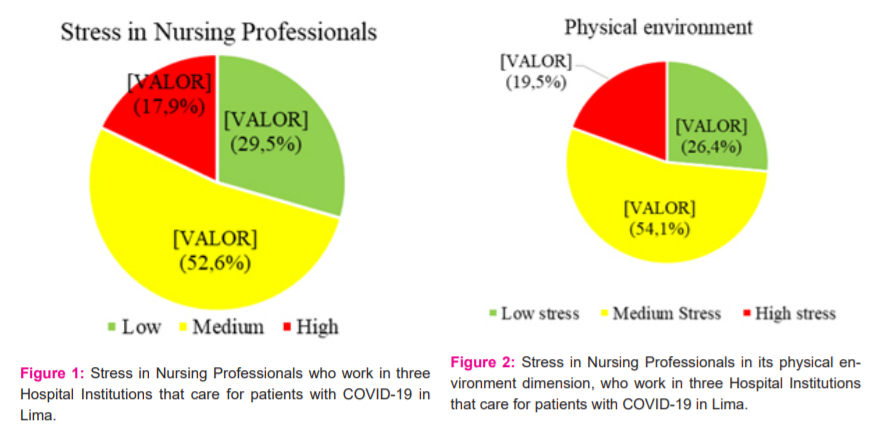
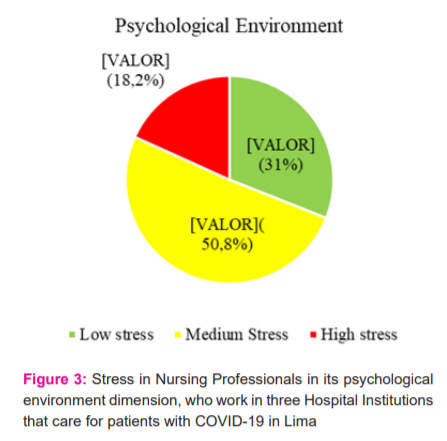
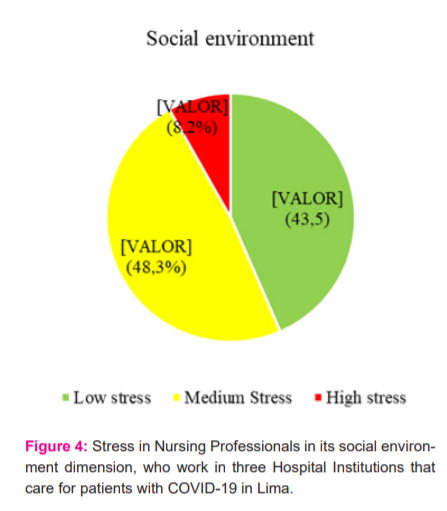
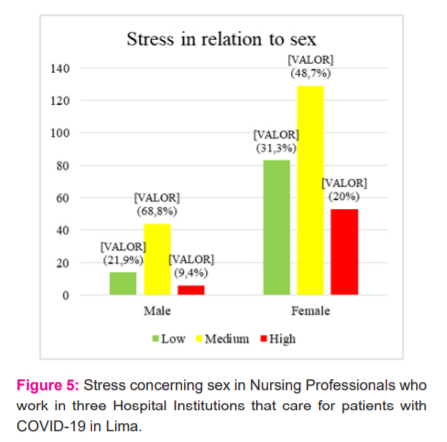
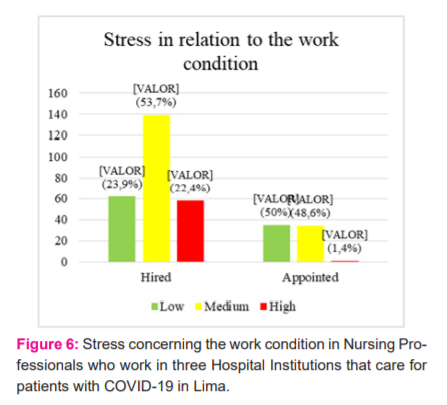

Figure 7: Stress in relation to years of service in Nursing Professionals who work in three Hospital Institutions that care for patients with COVID-19 in Lima
References:
1. Hou T, Zhang R, Song X, Zhang F, Cai W, Liu Y, et al. Self-efficacy and fatigue among non-frontline health care workers during COVID-19 outbreak: A moderated mediation model of posttraumatic stress disorder symptoms and negative coping. PLoS One. 2020;15:1–16.
2. Aslan H, Pekince H. Nursing students’ views on the COVID-19 pandemic and their perceived stress levels. Perspect Psychiatr Care. 2020;1(7):128.
3. Walton M, Murray E, Christian M. Mental health care for medical staff and affiliated healthcare workers during the COVID-19 pandemic. Eur Hear J Acute Cardiovasc Care. 2020;9(3):241–247.
4. Arnetz JE, Goetz CM, Arnetz BB, Arble E. Nurse reports of stressful situations during the COVID-19 pandemic: Qualitative analysis of survey responses. Int J Environ Res Public Health. 2020;17(21):1–12.
5. Ferreira V, Yuri T, Pereira A. Dificultades y temores de las enfermeras que enfrentan la pandemia de COVID-19 en Brasil Difficulties and fears of nurses facing the COVID-19 pandemic in Brazil. Humanidades Médicas 2020;20(2):312–333.
6. Yan S, Xu R, Stratton T, Kavcic V, Luo D, Hou F, et al. Sex differences and psychological stress: responses to the COVID-19 pandemic in China. BMC Public Health. 2021;21(1):1–8.
7. Carrasco O, Castillo E, Salas R, Reyes C. Estresores laborales y satisfacción en enfermeras peruanas durante la pandemia de COVID–19. SciELO Prepr. 2020;1(1):1–14.
8. Dos Santos L. Stress, Burnout, and Low Self-Efficacy of Nursing Professionals: A Qualitative Inquiry. Healthcare. 2020;8(4):424.
9. Salari N, Khazaie H, Hosseinian A, Khaledi B, Kazeminia M, Mohammadi M, et al. The prevalence of stress, anxiety and depression within front-line healthcare workers caring for COVID-19 patients: a systematic review and meta-regression. Human Resour Health. 2020;18(1):1–14.
10. Zhang Y, Wang C, Pan W, Zheng J, Gao J, Huang X, et al. Stress, Burnout, and Coping Strategies of Frontline Nurses During the COVID-19 Epidemic in Wuhan and Shanghai, China. Front Psychiatry. 2020;11:1–9.
11. Ali H, Cole A, Ahmed A, Hamasha S, Panos G. Major stressors and coping strategies of frontline nursing staff during the outbreak of coronavirus disease 2020 (Covid-19) in Alabama. J Multidiscip Healthc. 2020;13:2057–68.
12. Dutton S, Kozachik S. Evaluating the Outcomes of a Web-Based Stress Management Program for Nurses and Nursing Assistants. Worldviews Evidence-Based Nurs. 2020;17(1):32–38.
13. Hendy A, Abozeid A, Sallam G, Abboud H, Ahmed F. Predictive factors affecting stress among nurses providing care at COVID-19 isolation hospitals in Egypt. Nurs Open. 2021;8(1):498–505.
14. Del Pozo P, Garrido R, Santolalla I, Gea V, García P, de Viñaspre R, et al. Psychological impact on the nursing professionals of the rioja health service (Spain) due to the sars-cov-2 virus. Int J Environ Res Public Health. 2021;18(2):1–13.
15. Shahrour G, Dardas L. Acute stress disorder, coping self-efficacy and subsequent psychological distress among nurses amid COVID-19. J Nurs Manag. 2020;28(7):1686–1695.
16. Fernández C, Baptista P. Metodología de la Investigación. 6ta ed. México: Mc Graw-Hill/Interamericana.. 2015. 1–634 .
|






 This work is licensed under a Creative Commons Attribution-NonCommercial 4.0 International License
This work is licensed under a Creative Commons Attribution-NonCommercial 4.0 International License